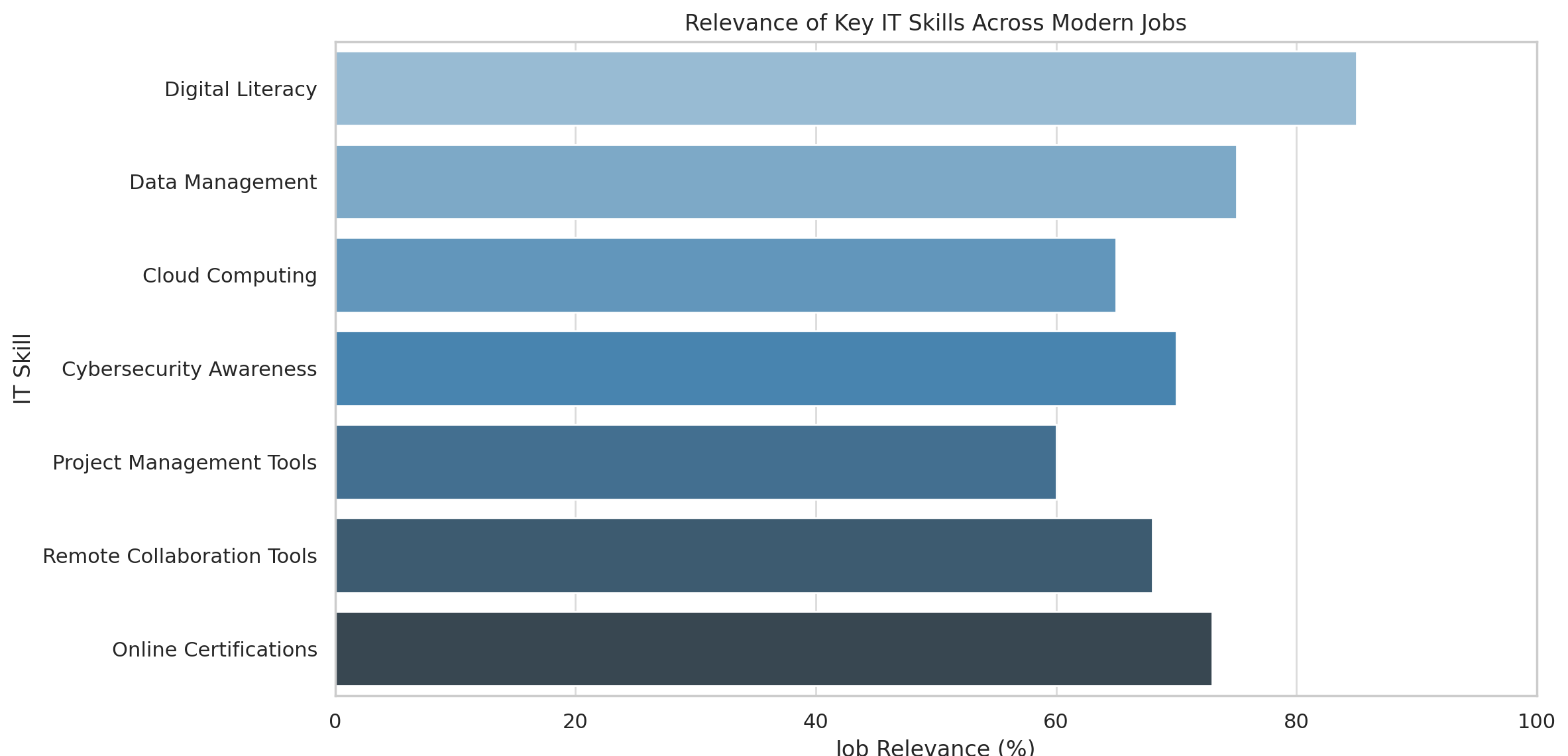
If you're wondering how to future-proof your career, understanding information technology is no longer optional. It has become a core part of nearly every profession. Whether you're managing finances, coordinating logistics, teaching, or working in healthcare, digital tools are probably already part of your daily work. But using them consciously and strategically can lead to long-term career growth.
A report by the World Economic Forum in 2023 predicted that by 2025, over 97 million new roles would emerge that require a mix of human and technical skills. At the same time, jobs that depend on outdated systems or manual processes are disappearing.
If you’re not learning how to work with technology, you’re essentially closing the door on many new opportunities.
Table of Content
- The Evolving Nature of Work and the Rise of IT
- Why IT Skills Are Useful in Every Career
- Essential IT Skills That Can Strengthen Your Career
- How IT Opens the Door to Remote and Flexible Work
- Online Learning as a Tool for Career Growth
- Gaining Certificates That Employers Respect
- Real Career Shifts Thanks to IT Training
- Freelancing and Entrepreneurship Made Possible by IT
- Personal Branding Through Technology
- What Employers Look for in Digital Skills
- Popular Tools That Improve Everyday Work
- Common Barriers—and How to Overcome Them
- How IT Strengthens Problem-Solving and Critical Thinking
- Staying Relevant in a Changing Job Market
- Conclusion
- FAQs
The Evolving Nature of Work and the Rise of IT
Workplaces are becoming more technology-dependent. From small family businesses to multinational companies, IT systems now power everything from internal communications to global supply chains.
The 2022 McKinsey report highlighted that more than 70% of middle-skill jobs now require some level of digital interaction.
Even in roles not labeled as "tech," you're expected to manage emails, handle files online, work with spreadsheets, and use virtual meeting tools. This baseline level of digital fluency is now a requirement.

Why IT Skills Are Useful in Every Career
Let’s say you work in education. Online learning platforms and grading tools save time and enhance student tracking. In agriculture? Farmers now rely on apps for crop planning, pricing, and weather predictions.
The same pattern shows up in retail, banking, transportation, and even the arts.
Being comfortable with tech makes your job easier. It can also reduce stress, increase your productivity, and make you more valuable to your employer.
Essential IT Skills That Can Strengthen Your Career
Digital Literacy
This includes knowing how to manage files, send professional emails, and operate basic software like word processors and spreadsheets. It’s the digital equivalent of reading and writing.
Data Management and Analytics
Understanding how to gather, sort, and interpret data can give you insights that help improve your performance. You don’t need to become a data scientist—just learning Excel or Google Sheets can make a difference.
Cloud Storage and File Sharing
Knowing how to store your files in the cloud means you can access your work from anywhere. It improves collaboration and protects your files from being lost on a single device.
Cybersecurity Awareness
Basic cybersecurity habits—like using strong passwords and recognizing phishing scams—help protect both personal and professional information. IBM's 2023 report states that human error causes most security breaches.
Remote Work Tools
Familiarity with platforms like Zoom, Microsoft Teams, or Slack is essential. These tools allow you to communicate effectively with colleagues, even when working from home.
How IT Opens the Door to Remote and Flexible Work
Technology makes it easier to work from anywhere. Many companies now offer remote or hybrid jobs. This flexibility is beneficial for parents, people with disabilities, or anyone living far from city centers.
A Stanford study found that remote workers using digital tools were 13% more productive. This isn’t just about convenience—it’s about getting more done in less time.
Online Learning as a Tool for Career Growth
Platforms like Coursera, edX, and Skillshare let you learn at your own pace. You can earn certificates in project management, design, coding, and more—often for free or at low cost. These are fundamental skills that can help you change careers or get promoted.
The 2023 Coursera Skills Report showed a significant rise in non-traditional learners acquiring tech-related skills. This means you don’t need to go back to school to stay competitive.
Gaining Certificates That Employers Respect
Certifications from Google, Microsoft, or other recognized names carry weight. For example, the Google IT Support Certificate has helped thousands of people land entry-level roles without prior tech experience.
LinkedIn’s hiring data shows that candidates with verifiable online certificates are more likely to be considered for new roles. It's not about the degree anymore—it's about the skills.
Real Career Shifts Thanks to IT Training
Take the example of Anita, who worked as a receptionist. During lockdown, she learned digital marketing through a free online course. Now, she manages social media for a regional business and earns twice her previous salary.
Or Ramesh, a retail worker who took Excel and inventory management courses. He moved into a supply chain analyst role and is now helping to train others.
These aren’t rare stories. They reflect a growing trend of workers using online tools to upgrade their careers.
Freelancing and Entrepreneurship Made Possible by IT
If you’ve ever wanted to work independently, tech makes it much easier. Platforms like Fiverr, Upwork, or Freelancer allow writers, designers, consultants, and many others to find clients.
Simple skills like website creation (using tools like WordPress) or graphic design (using Canva) can lead to side gigs or full-time freelance careers.
Personal Branding Through Technology
Your online presence can say as much about you as your resume. A polished LinkedIn profile, a personal blog, or a portfolio website can help you stand out.
Hiring managers often search for candidates online. Being visible and credible in these spaces increases your chances of getting noticed.
What Employers Look for in Digital Skills
Job listings often include tools like Excel, WordPress, or CRM systems. They also value soft skills like the ability to troubleshoot tech issues or learn new software quickly.
The PwC Upskilling Report shows that businesses investing in tech training have more productive teams and better employee retention.
Popular Tools That Improve Everyday Work
Trello
Helps manage projects by tracking tasks visually.
Notion
Great for organizing notes, calendars, and team workspaces.
Asana
Widely used in companies for tracking team assignments and progress.
Zoom and Slack
Support meetings and communication across time zones.
Even if you don’t work in tech, knowing these tools can make you more efficient and dependable.
Common Barriers—and How to Overcome Them
Many people hesitate to learn new tech skills because they think they’re too old, not smart enough, or too busy. But learning digital tools is like learning to drive—it’s challenging at first, but easier with practice.
Start with one small thing: create a Google account, open a YouTube tutorial, or take a free introductory course. Small steps build confidence over time.
Simple Ways to Start Learning IT
-
Pick one tool you use daily and learn its full features.
-
Enroll in a free course on a platform like Coursera or Udemy.
-
Practice what you learn by applying it at work or in personal projects.
-
Join online communities or forums to ask questions and share progress.
-
Build a digital portfolio to show your skills.
How IT Strengthens Problem-Solving and Critical Thinking
Technology doesn’t just make tasks easier—it also improves how we think. For example:
-
Spreadsheets teach logical thinking and planning.
-
Coding (even basic) sharpens problem-solving skills.
-
Using design tools improves creativity and visual communication.
These are transferable skills that benefit all kinds of jobs.
Staying Relevant in a Changing Job Market
It’s not enough to rely on experience anymore. The job market changes fast. But people who adapt, learn, and grow with technology stay competitive.
Even a minor update in your tech skills can move your resume to the top of the pile. Employers want people who are flexible and ready to learn.
Conclusion
Technology is shaping every aspect of how we work. But it’s not something to be afraid of. You don’t have to be a programmer to benefit from IT. You just need curiosity and a willingness to learn.
Start with one small skill, practice it, and build from there. The benefits—more job options, higher income, remote work possibilities—are well within reach. And in a world where skills matter more than titles, information technology gives you the tools to build the career you want.
FAQs
1. Do I need a tech background to learn IT skills?
No. Many online courses start at the beginner level and build up gradually.
2. Are IT certifications worth it if I already have a degree?
Yes. They show employers that you're proactive and up-to-date with current tools.
3. Can I get a remote job if I improve my tech skills?
Absolutely. Remote roles often prioritize tech literacy over degrees or experience.
4. What's the fastest way to learn useful IT tools?
Start with one course focused on a tool you need for work, like Excel or Trello.
5. Is it too late to switch careers using IT skills?
Not at all. Many people change careers in their 30s, 40s, or beyond with new tech training.
Information Technology Career Development

